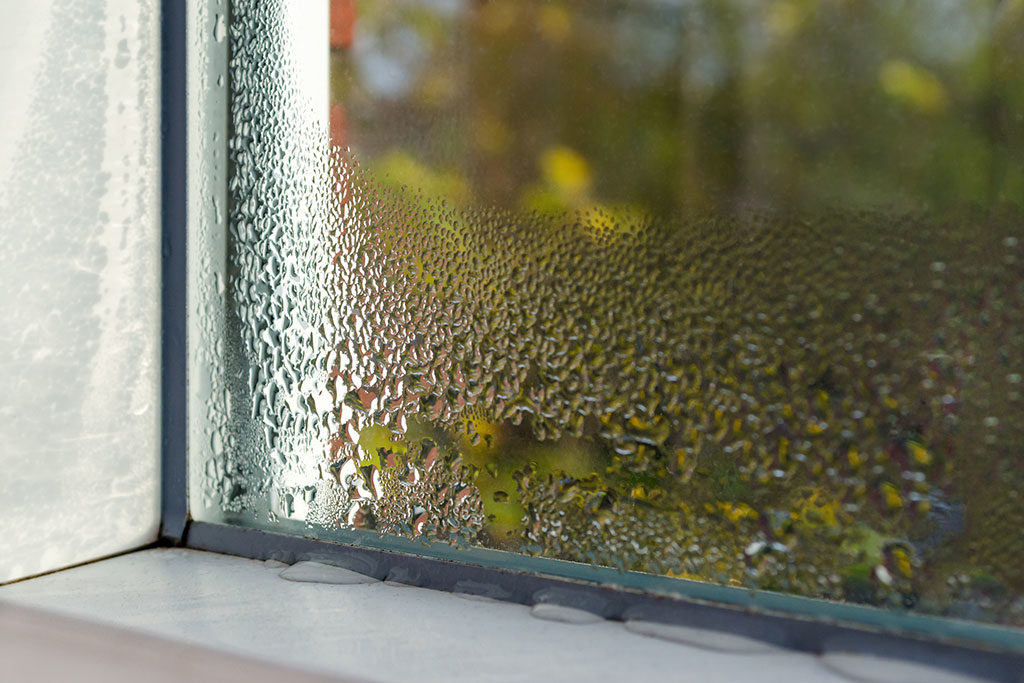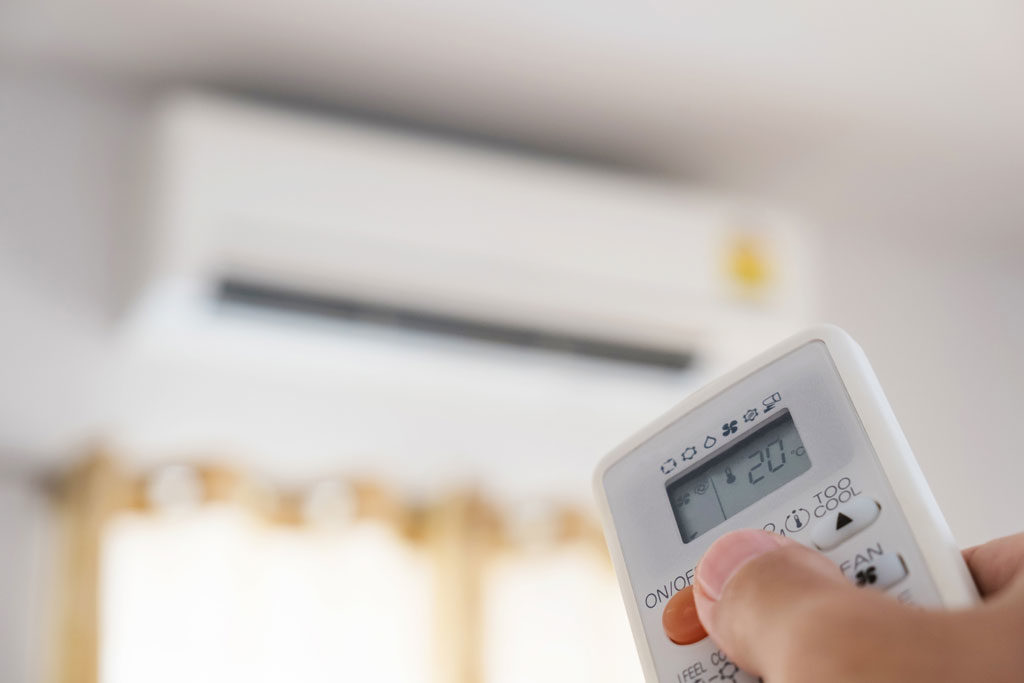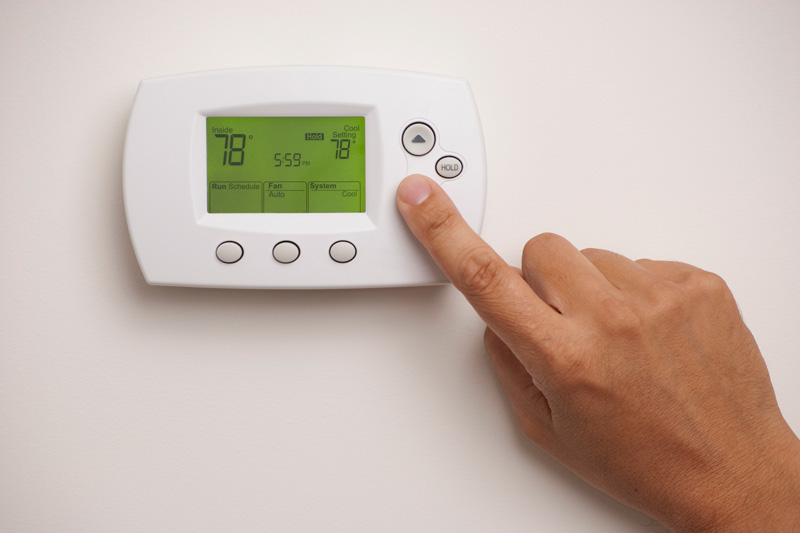Surprising Ways to Reduce Humidity in Your Home
Posted on by WestAIR Heating & Cooling

If you’ve been noticing foggy windows, musty odors, or clammy air throughout your home, chances are, your humidity levels are high. Humidity can both rob you of comfort and threaten your health. We don’t want you to suffer through the stifling heat, so we’ve outlined some surprising ways to reduce humidity in your home.
But first, a word about relative humidity (RH): RH measures water vapor relative to the temperature of the air. RH illustrates the amount of water in the air in relation to the total amount of humidity that could be held at the current temperature. Weather forecasts report relative humidity because it affects how we feel the temperature. Humid air feels warmer; dry air feels cooler. The ideal indoor relative humidity for a home is between 40 and 60 percent. If your RH is lower or higher, follow these tips:
Go old school with laundry
Dry your clothing outside. If you hang wet clothing inside to dry, all the moisture will evaporate into the air.
Accessorize with plants
Invest in some household tropical plants like Boston ferns, English ivies, Peace lilies, Reed Palms, or Tillandsias. These plants absorb moisture from the air instead of through the roots.
Take cold(er) showers
Hot showers create steam. Plan to bathe after exercising or spending time outside in the heat. You’ll be less tempted to jump into a steaming shower, and the cool water will feel refreshing. If nothing else, run the exhaust fan during and after showering.
Eat more salads
Hot weather provides the perfect opportunity to cook outside on the grill or eat cold meals like salads and sandwiches. Avoid boiling water; instead, save the heavy pasta for cooler weather. Your body will thank you in more ways than one.
Check the drainage route
In high humidity, your air conditioner or dehumidifier will produce a lot of condensation that has to go somewhere. Regularly empty the drip pan and be sure the drain lines are working properly so the water doesn’t evaporate back into the air.
Replace your flooring
Carpet is known to retain moisture. If you’ve tried all the above methods to decrease humidity, but still have a problem with moisture, consider replacing the carpet with hardwood flooring.
Benefits of proper humidity
With lower humidity levels, you could raise the thermostat setting a few degrees and still be comfortable. High humidity may cause headaches and asthma symptoms such as wheezing, shortness of breath, or a chronic cough. Proper humidity levels are easier on your respiratory tract and can:
- Reduce your cooling costs.
- Minimize wear on your HVAC system.
- Prevent dust mites, mold, bacteria, and mildew.
- Eliminate foul odors.
- Help you sleep better.
If you are still having trouble, consult with the professionals at WestAIR Heating & Cooling. We offer high-efficiency air conditioners to keep you cool in the muggy season and countless air quality accessories to reduce humidity. Schedule service to have a technician visit your home and recommend the right solutions for your family’s total indoor air comfort.
Contact us for more information.
This entry was posted in Air Conditioning,Cooling,Health Tips,Indoor Air Quality,Tips and tagged Air quality accessories, Asthma, Comfortable, Cooling, Dehumidifier, Energy efficiency, Energy savings, Grilling out, Humidity, HVAC, HVAC tips, Indoor air, Indoor air quality, Indoor air quality solutions, Muggy season
Top Tips for Summer Cooling
Posted on by WestAIR Heating & Cooling

Warm weather is great for barbecues, days at the beach, and evening campfires, but not so great on your home’s cooling system. Some homeowners fight the urge to turn on their air conditioning, and others let it run, dreading their summer utility bills. Thankfully, there are options that will save you from the heat, give you peace of mind, and treat your pockets kindly. Here are some top tips for summer cooling:
Protect your home and equipment
Weatherizing your home isn’t just for winter. An air-tight system will save you money on cooling. Caulk your windows and doors so the cool air your system produces won’t escape. Up to 30 percent of home heat in the summer comes in through the windows. Use blinds, curtains, and drapes to block out the sun and keep daytime heat out.
Schedule maintenance with a qualified technician before the heat of summer. If you regularly service your HVAC equipment, it’ll last longer and run more efficiently. Proper DIY maintenance like keeping your outdoor unit clear of debris and regularly dusting your home will ensure dirt and dust don’t infiltrate your system and ruin your equipment. Check your filter once a month and replace as needed. If your air filter collects dust and debris, airflow will be restricted, and your unit will have to work harder.
Distribute air
Close off any unused rooms so you are only cooling the areas you use frequently, but make sure the rest of your home is well ventilated. Check that your supply and return registers aren’t blocked by furniture. Flip the switch on the motor housing of your ceiling fans to summer mode (counterclockwise). The blades will push the air straight down and create a wind-chill effect. Turn off your cooling system and open your windows in the evening to save money and provide your home with fresh air. Consider other indoor air quality solutions like an air exchanger or cleaner.
Avoid heat-producing appliances
Appliances that use heat can waste the cold air your cooling system produces. Instead of cooking in your oven, enjoy the outdoors by grilling more often. Air-dry your dishes and laundry instead of using the dishwasher and dryer. Take cool showers so your water heater won’t have to run as often. In addition, keep heat-producing appliances away from your thermostat so it reads the temperature accurately and doesn’t overcompensate.
If you’re still using incandescent light bulbs, replace them with LED lights. Incandescent bulbs create light by using electricity to heat up a filament until it glows. Ninety percent of the energy used to light up the filament is wasted on heat. LEDs create light through a cold process, producing little amounts of heat in comparison.
Take advantage of technology
According to the EPA, when used properly, a programmable thermostat can save you up to $180 a year in energy costs. With a programmable thermostat, you can set the temperature of your home higher when you leave for work or a trip and lower it shortly before you return.
Replace your old unit with a more efficient system. It may be more expensive up front, but a new air conditioner with a high SEER rating can give you maximum energy savings and reduce your carbon footprint. You’ll also enjoy peace of mind knowing your unit won’t likely break down on the hottest days of summer.
WestAIR Heating & Cooling provides energy-efficient Rheem A/C units, smart thermostats, filters, and other cooling solutions. We offer annual service maintenance and a variety of specials so you can save money and keep your HVAC system running smoothly. Contact us to learn more.
This entry was posted in AC,Air Conditioning,Cooling,Energy Savings and tagged A/C, A/C tune-up, Air circulation, Air cleaner, air conditioning, Air filters, Comfortable, Cooling, Cooling system, Energy efficiency, Energy savings, Grilling out, Hot days, HVAC, Indoor air quality, Indoor air quality solutions, Window curtains
Money-Saving Tips to Keep your Home Cool this Summer
Posted on by WestAIR Heating & Cooling
Have you switched your thermostat over to cool yet this spring? When the weather turns hot and sticky, you may be tempted to crank the a/c. Give yourself some peace of mind and follow these money-saving tips to keep your home comfortable this summer.
A/C Maintenance
Avoid an expensive breakdown during summer’s scorching hot days. HVAC technicians are working their peak seasons, so wait times could be longer than you’d like. Instead, schedule your a/c tune-up to keep your air conditioner working at top performance. Technicians will clean parts covered with dust and debris, fill coolant levels, tighten electrical connections, and more. You should always change your air filter every month during cooling (and heating months), too!
Thermostat
Program your thermostat this summer to the warmest comfortable temperature, and even warmer while you are away. However, while you’re away, don’t turn your air conditioner off on extremely hot days. The materials in your home will retain heat, so keeping the room cooler will make it easier for your air conditioner to run. On colder nights, you can turn off your cooling unit and open the windows. Then close them right away in the morning to trap the cooler air inside.
Windows
Use curtains and shades during the day to block direct sunrays from heating your home. Exterior awnings can reduce extra heat by up to 75 percent on west-facing windows! It’s also important to caulk or weather strip any drafty windows.
Air Circulation
Maintain maximum efficiency by inspecting your air ducts for any leaks. Keep cool air circulating in the right areas by closing doors and vents to any rooms not in use. Using an exhaust fan in bathrooms or kitchens also removes heat and moisture from your home, which helps prevent wall damage and mold.
Appliances
Save money on your electric and water bills by less frequent use of appliances that add heat to the house. Avoid using the oven by preparing cold meals or grilling outside on hot days. Air-dry your dishes and laundry. Your water heater is another culprit for extra heat, so try taking shorter and cooler showers on warm days as well.
Plant trees
Planting tall trees can cool your house naturally. Suburban and urban areas are warmer than rural ones because of the heat absorbed by roads, buildings, and parking lots. Planting tall trees to block windows can save you up to 35 percent annually on energy costs while keeping your home cooler and giving your yard extra curb appeal.
Contact WestAIR Heating & Cooling for your annual a/c tune-up and personalized suggestions to keep your home comfortable this summer!
This entry was posted in AC,Air Conditioning,Cooling and tagged A/C maintenance, A/C tune-up, A/C tune-up, Air circulation, Air conditioner maintenance, Air conditioner tune-up, Air ducts, Air filters, Comfortable, Cooling system, Energy efficiency, Exhaust fan, Grilling out, Heating and cooling, Hot days, Humid days, HVAC technician, Plant trees, Summer days, Thermostat, Tune-up, Window curtains, Window shadows, Window tips
Subscribe to Our Blog
With RSS feeds, you don't have to visit our site everyday to keep up to date. Simply subscribe to our blog via RSS or Email and our posts will come to you!
Search Blog Posts
Categories
Archives
- April 2024 (1)
- February 2024 (1)
- January 2024 (1)
- February 2023 (1)
- January 2023 (1)
- December 2022 (1)
- November 2022 (1)
- October 2022 (1)
- September 2022 (1)
- August 2022 (1)
- July 2022 (1)
- June 2022 (1)
- May 2022 (1)
- April 2022 (1)
- March 2022 (1)
- February 2022 (2)
- December 2021 (1)
- November 2021 (1)
- October 2021 (1)
- September 2021 (1)
- August 2021 (1)
- July 2021 (1)
- June 2021 (1)
- May 2021 (1)
- April 2021 (1)
- March 2021 (2)
- January 2021 (1)
- December 2020 (1)
- November 2020 (1)
- October 2020 (1)
- September 2020 (1)
- August 2020 (1)
- July 2020 (1)
- June 2020 (1)
- May 2020 (1)
- April 2020 (1)
- March 2020 (1)
- February 2020 (2)
- November 2019 (1)
- August 2019 (2)
- June 2019 (1)
- May 2019 (1)
- April 2019 (1)
- March 2019 (1)
- February 2019 (1)
- January 2019 (1)
- December 2018 (1)
- November 2018 (1)
- October 2018 (1)
- September 2018 (1)
- August 2018 (2)
- July 2018 (1)
- May 2018 (1)
- April 2018 (1)
- March 2018 (1)
- February 2018 (1)
- January 2018 (1)
- December 2017 (3)
- November 2017 (2)
- October 2017 (2)
- September 2017 (2)
- August 2017 (1)
- July 2017 (2)
- June 2017 (3)
- May 2017 (2)
- January 2017 (4)
- November 2016 (1)
- September 2016 (3)
- July 2016 (2)
- June 2016 (2)
- May 2016 (4)
- April 2016 (1)
- March 2016 (2)
- February 2016 (2)
- January 2016 (1)
- August 2015 (1)
- July 2015 (1)
- June 2015 (3)
- May 2015 (1)
- July 2014 (2)
- June 2014 (1)
- April 2014 (1)
- March 2014 (1)
- February 2014 (2)
- October 2013 (1)
- May 2013 (1)
- March 2013 (1)
- February 2013 (1)
- August 2012 (1)
- July 2012 (2)
- June 2012 (2)
- May 2012 (2)
- March 2012 (1)
- February 2012 (1)
- December 2011 (1)
- November 2011 (1)
- October 2011 (1)
- September 2011 (1)
- August 2011 (1)
- June 2011 (1)
- May 2011 (1)

 Subscribe
Subscribe Subscribe
Subscribe